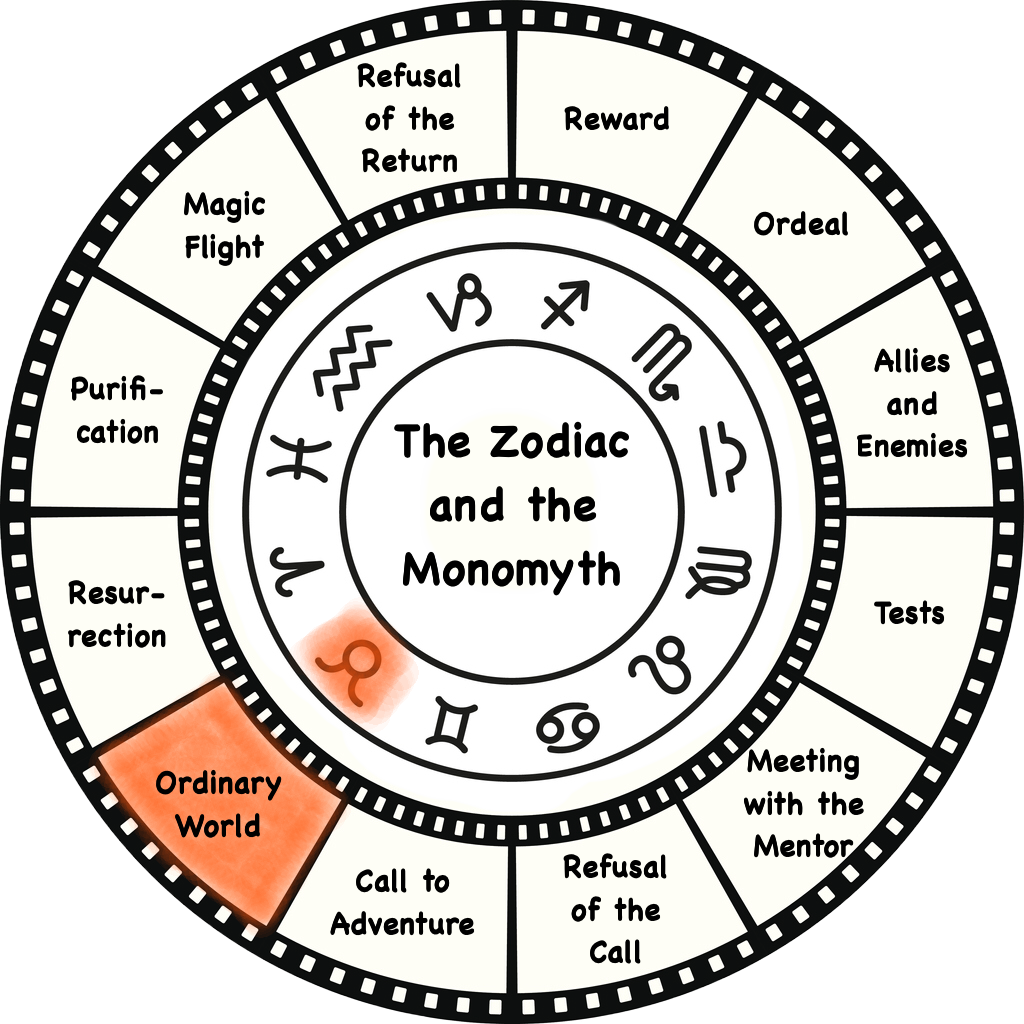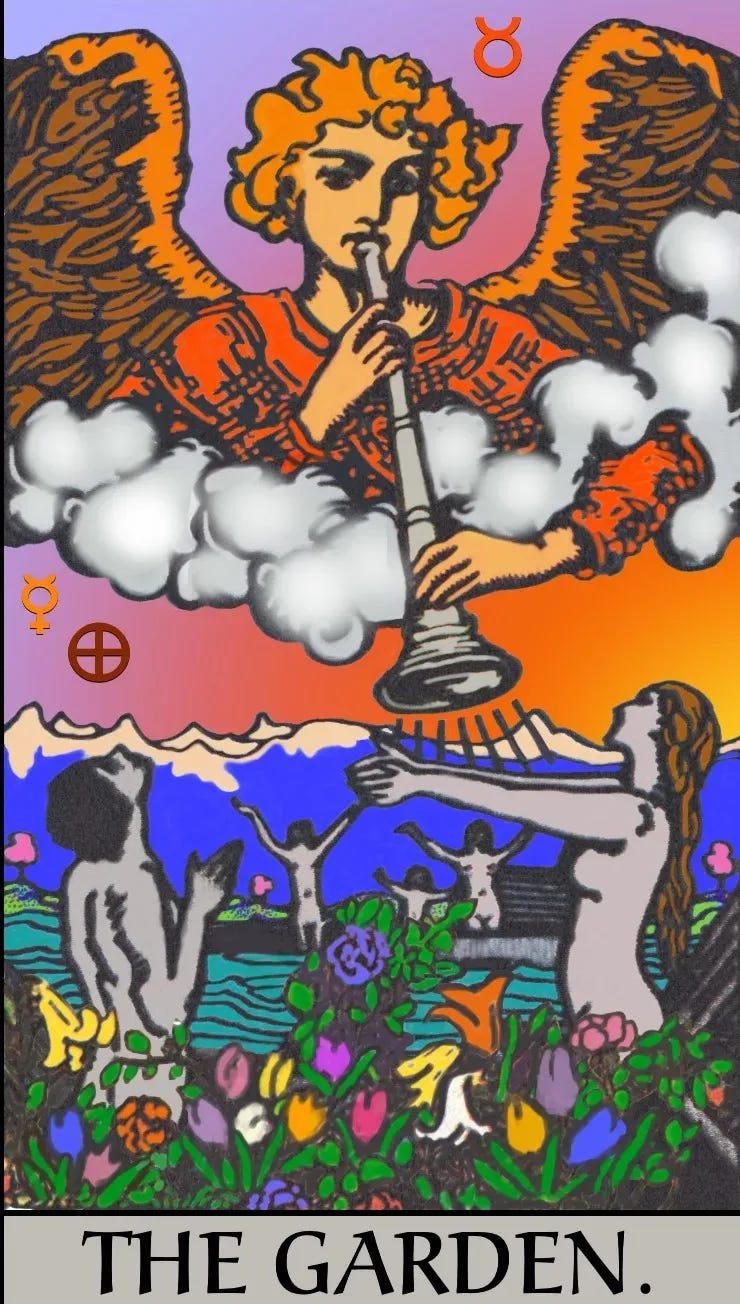Quest for the Elixir: Welcome to the Ordinary World
The Ordinary World, Taurus, and The Garden (Judgment)
Quest for the Elixir
This post is part of an ongoing series. If you’re new to it, you’ll want to read the introduction first (about 6 minutes):



Three Articles About a Chapter of the Universal Story
Each edition of Quest for the Elixir consists of three articles about one of the 12 chapters in the cyclical Universal Story.
The first article is an exploration of the chapter from the perspective of the Hero’s Journey in Joseph Campbell’s monomyth.
The second article is a view of the same chapter in terms of the Zodiac sign corresponding to it in the cycle.
The third article is about the meaning of the chapter as symbolized in a Major Arcana card of the tarot.
During the month of the Sun’s transit through Taurus, we observe the chapter of Welcome to the Ordinary World in the Universal Story. In celebration, I offer the following three articles:
The Monomyth: The Ordinary World
“For if anything is capable of making a poet of a literary man, it is my hometown love of the human, the living and ordinary.” ― Joseph Campbell, The Power of Myth
Are we reading that quote correctly? Is Campbell really saying that the ordinary can inspire poetry? Yes, indeed, flaws and all. It’s an amazing and wonderful mystery, just as it is. In fact, in a way the world is a sort of poetry.
It’s not objective perfection that makes the Ordinary World so inspirational to anyone, but rather a subjective realization that it’s exactly what it should be in the moment it’s perceived.
“The world is perfect. It's a mess. It has always been a mess. We are not going to change it.” ― Joseph Campbell
I like to think of this paradox in terms of geometry. At the Divine ‘Center’ of everything, there is no time, but an eternal and perfect balance of infinite potential. In the physical world, however, we are never at the ‘Center’. We are always somewhere on the ‘perimeter of a circle’, experiencing some particular point in a cycle of time. That means our outerworldly experience can’t possibly be other than lopsided, always with more of some things and less of others, i.e., always imperfect.
Fortunately, our minds can see both without and within. Initially we see only the imperfect outer world, then over time we develop an inner concept of the perfect whole. Before we see how the outer connects with the inner, we tend to compare the two and feel cheated to be “stuck” in the inferior outer world. But when we are aware of the connections, we can view experiences of the moment in their context within the perfectly balanced Whole and realize that we are simultaneously in both worlds. That perception lets us stop taking passing events too seriously; we can move through them with less stress, more serenity, and wiser judgment. No, our current situation is not perfect, but it’s exactly what it should be right here and now. Life is always slowly changing, and we can appreciate it for exactly what it is at any moment.
"The happy ending of the fairy tale, the myth, and the divine comedy of the soul, is to be read, not as a contradiction, but as a transcendence of the universal tragedy of man. The objective world remains what it was, but, because of a shift of emphasis within the subject, is beheld as though transformed. Where formerly life and death contended, now enduring being is made manifest — as indifferent to the accidents of time as water boiling in a pot is to the destiny of a bubble, or as the cosmos to the appearance and disappearance of a galaxy of stars." — Joseph Campbell
So, at the end of The Wizard of Oz, Dorothy Gale returns to her Ordinary World in Kansas after her adventure in Oz, just glad to be alive there no matter what. She’s learned something. Having experienced “somewhere else”, she no longer has any reason to wish she were anywhere else but where she’d started from. Now she can be fully focused and happy in her immediate surroundings, almost like a newborn infant to whom the prospect of “somewhere else” has never occurred.
But Dorothy couldn’t have rediscovered that fresh outlook if she hadn’t experienced the trials and lessons of the Hero’s Journey. We’ll look now at the state of limited awareness and discontent that predisposed Dorothy, like all heroes at their journey’s outset, to undergo it in the first place.
"The usual hero adventure begins with someone from whom something has been taken, or who feels there is something lacking in the normal experience available or permitted to the members of society. The person then takes off on a series of adventures beyond the ordinary, either to recover what has been lost or to discover some life-giving elixir. It's usually a cycle, a coming and a returning." ~ Joseph Campbell
The universal hero typically starts out in very basic, earthy and humble surroundings, a natural world where there are plants and animals, and where everything he needs to survive is available. Though not objectively “perfect”, that natural world is not a bad place. But in the beginning, when he first notices disturbing flaws, the hero can’t see it that way and doesn’t want to stay there.
"Deep down, below the surface of the average man's conscience, he hears a voice whispering, "There is something not right," no matter how much his rightness is supported by public opinion or moral code." — Carl Jung
Dorothy’s Ordinary World is a farm. Life there is no more nor less “perfect” than any other place, but lacking the perspective to truly appreciate it for what it is, she tends to take it for granted. She also has a child’s highly sensitive feelings and limited resourcefulness to deal with trouble. So when a spiteful neighbor is unkind to her, she reacts with a fervent wish to simply escape from all her troubles to somewhere else that she imagines is trouble-free.
Taurus
The three Earth signs in the Zodiac reflect the fundamental stages of growth and decay in the vegetation cycle on earth and the ways we treat our resources in order to maintain life. Virgo reflects ripe fruit and harvest labor, Capricorn consolidation into seed, and Taurus the floral fertility of spring planting time.
The garden-like characteristics of Taurus include physical beauty, value, fertility, and productivity. Simple and basic, it seeks only to stay where it is, maintain its value, and grow even richer than its initial beauty promises. Taurus appreciates and savors “the good things of life”.
That quality matters very much to Taurus, as do the pleasures of the five physical senses, is apparent in the Taurean style. In addition to earthy natural beauty, its value and desirability may be enhanced through tasteful choices in fashion, jewelry, or fragrance, and often through the charms of music.
In an astrological chart, houses represent the various ‘departments’ of life, and the places where they function. The natural house of Taurus is the 2nd house, located in the lower left part of the wheel as shown above. That’s the house of values and possessions, and the sign on its cusp describes the kind of material things we value and like to keep. It includes treasured objects we make or acquire, as well as earned income and the stash in our piggy bank or bank account.
In the language of astrology, planets function as ‘nouns’ or ‘verbs’ that represent or express the various energies of life. Each sign reflects the qualities of the planet which rules it. While Saturn is the only planet with an actual earth-structuring function, it rules only one of the Earth signs: Capricorn. The other two Earth signs are ruled by Airy planets that lend their mental energies to earth for adaptation to the seasonal changes. Careful, efficient Mercury rules Virgo, and charming, alluring Venus rules Taurus.
Venus is the “right-brained” Airy planet. Inspired by intuition, Venus ‘thinks’ in a contextual, graceful, artistic way, all for harmony’s sake. As ruler of the sociable Air sign Libra, congenial Venus promotes interpersonal harmony and experiences with art forms. As ruler of the productive Earth sign Taurus, sweet Venus decorates and scents the natural materials of the earth, and promotes fertility.
Venus always wants to beautify and attract, but it has a negative side, as all the planets do. The negative side is sweet, but likely to be too sweet, or too strong, garishly overdone, or tasteless in some other way. Negative Venus lacks the sincerity of harmony for harmony’s sake, and is overly material, tending to be preoccupied with vanity, sensual gratification, or mercenary motivation.
Venusian people are charming, friendly, and cooperative. Averse to discord and stress, they encourage a peaceful atmosphere where everyone gets along well and enjoys life’s pleasures.
The Garden (Judgment)
In early morning, an angel in the air is blowing a horn to herald the golden Sun, which has just risen over the mountains. Colorful spring flowers bloom from the earth in the foreground. Open coffins are floating on water, each with a resurrected person rising from it to behold a brand new world.
All the Four Elements have been brought together to make this awesome natural world, a gift to the people. And in return, each unique person, emerging like a new shoot from a watered seed, is a newly-opened gift to the world.
"When you look at that nature world it becomes an icon, it becomes a holy picture that speaks of the origins of the world. Almost every mythology sees the origins of life coming out of water. And, curiously, that's true. It's amusing that the origin of life out of water is in myths and then again, finally, in science, we find the same thing. It's exactly so." ~ Joseph Campbell
As we begin a life on earth as an infant, we find ourselves in some version of The Garden. It’s a natural ‘garden’ where we are cared for and our basic needs are supplied. As we are not yet mobile, our experience with the world is limited to what we have: our bodies and our immediate surroundings. That’s all we know, and it’s enough. For a time we can simply trust in Life and enjoy the peace, and we do.
In the spring of any year, Nature brings us out of snow and ice into falling and flowing water, into milder weather and colorful, blossoming vegetation, reminders of The Garden and its gifts. It’s an invitation to remember our trust in Life and enjoy the peace we have. (Do we?)
At the start of any day, we normally awaken from a night’s visit in another reality to find ourselves in our own solid bed, in our room with our favorite possessions right there where we’d left them. Before leaping out of bed, we might pause to remember with gratitude our trust in Life and enjoy the peace we have. (Do we?)
"We are kept out of the Garden by our own fear and desire in relation to what we think to be the goods of our life." — Joseph Campbell
How easily we can become too preoccupied with desires for gain or fears of loss to appreciate what we have while we have it! But when our wants are simple, deprivation is less of a threat. We regain our inner Garden and truly appreciate whatever we have.
So how content are we with what we have in life? Do we appreciate the simple things? How can we encourage good things to grow? What can we make for ourselves? How can we enhance the value of our possessions? While we’d be foolish to believe we never have enough, we’re wise to make the best of what we have.
Are we suffering from discontent like Dorothy, earnestly yearning for something other than what we have? If so, that’s okay. After all, we’re on earth to learn, and that will require a long and challenging journey. Since we’re here, we must need to take it, so be it. And the next time we awaken here in the Garden, we’ll appreciate its gifts (even) more than we do now.
In divination, I read the Garden as a state of delighted contentment in one’s world and its gifts. Either that world is a new discovery, or it feels as though it were.
If it’s reversed, I read it as discontentment and rejection of one’s “Ordinary World”. Something about it is experienced as disturbing and wrong. One can’t enjoy it as it is, and wishes for some sort of remedy.









